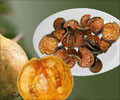Decline of detoxification pathways are causally linked to cardiovascular disease, diabetes, cancer, some of the primary causes of death in the developed world.

‘At much lower levels, a compound - N-acetyl-cysteine, or NAC might help maintain glutathione levels and prevent the routine metabolic declines associated with aging.’





In that context, the research not only offers some profound insights into why the health of animals declines with age, but specifically points to a compound that might help prevent some of the toxic processes involved. Decline of these detoxification pathways, scientists say, are causally linked to cardiovascular disease, diabetes and cancer, some of the primary causes of death in the developed world.
"We've known for some time of the importance of glutathione as a strong antioxidant," said Tory Hagen, lead author on the research and the Helen P. Rumbel Professor for Health Aging Research in the Linus Pauling Institute at OSU.
"What this study pointed out was the way that cells from younger animals are far more resistant to stress than those from older animals," said Hagen, also a professor of biochemistry in the OSU College of Science. "In young animal cells, stress doesn't cause such a rapid loss of glutathione. The cells from older animals, on the other hand, were quickly depleted of glutathione and died twice as fast when subjected to stress.
"But pretreatment with NAC increased glutathione levels in the older cells and largely helped offset that level of cell death." Glutathione, Hagen said, is such an important antioxidant that its existence appears to date back as far as oxygen-dependent, or aerobic life itself - about 1.5 billion years. It's a principal compound to detoxify environmental stresses, air pollutants, heavy metals, pharmaceuticals and many other toxic insults.
Advertisement
NAC, the researchers said, is known to boost the metabolic function of glutathione and increase its rate of synthesis. It's already used in emergency medicine to help patients in a toxic crisis, such as ingestion of poisonous levels of heavy metals. It's believed to be a very safe compound to use even at extremely high levels - and the scientists are hypothesizing that it might have significant value at much lower doses to maintain glutathione levels and improve health.
Advertisement
Also of interest, Hagen said, is the wide range of apparent detoxification potential offered by glutathione. Higher levels of it - boosted by NAC - might help reduce the toxicity of some prescription drugs, cancer chemotherapies, and treat other health issues.
"Using NAC as a prophylactic, instead of an intervention, may allow glutathione levels to be maintained for detoxification in older adults," the researchers wrote in their conclusion.
Source-Eurekalert















